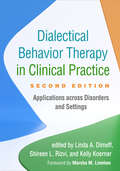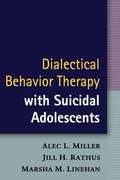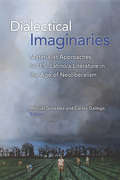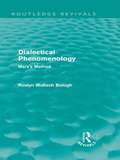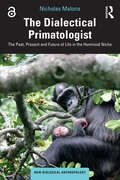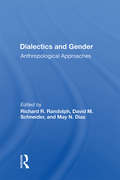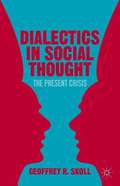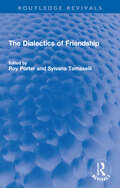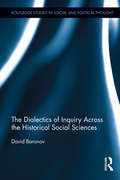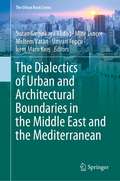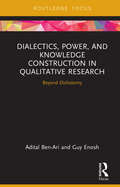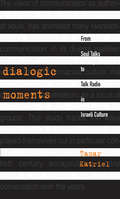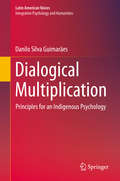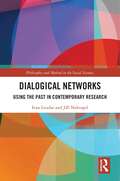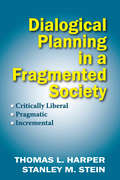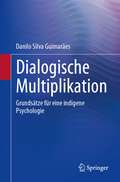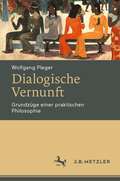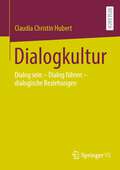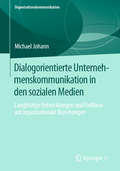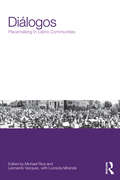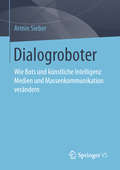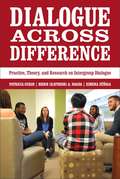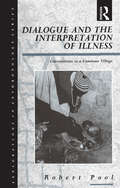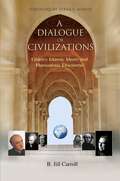- Table View
- List View
Dialectical Behavior Therapy in Clinical Practice, Second Edition: Applications across Disorders and Settings
by Linda A. Dimeff Shireen L. Rizvi Kelly Koerner Marsha M. LinehanThis influential work has now been substantially revised with over 60% new material reflecting over a dozen years of research and clinical advances. Leading experts describe innovative ways to use dialectical behavior therapy (DBT) in a wide range of real-world clinical and community settings. The volume provides wise guidance on setting up, running, and evaluating a comprehensive DBT program. It also presents adaptations designed to meet the needs of particular client populations as time- and cost-effectively as possible. Vivid case examples illustrate diverse applications of DBT for helping adults, adolescents, and children reduce suicidal and self-harming behavior; overcome complex, multiple challenges; and build a life worth living. New to This Edition *Presents current best practices for making DBT more efficient and accessible while maximizing program fidelity. *Chapters on additional populations, including persons with posttraumatic stress disorder and preadolescent children. *Chapters on additional settings, including milieu-based programs, university counseling centers, and middle and high schools. *Chapters on pharmacotherapy, promoting employment and self-sufficiency, training and supervision, and DBT beyond Stage 1. See also Doing Dialectical Behavior Therapy: A Practical Guide, by Kelly Koerner, which demonstrates DBT techniques in detail.
Dialectical Behavior Therapy with Suicidal Adolescents
by Alec Miller Jill RathusFilling a tremendous need, this highly practical book adapts the proven techniques of dialectical behavior therapy (DBT) to treatment of multiproblem adolescents at highest risk for suicidal behavior and self-injury. The authors are master clinicians who take the reader step by step through understanding and assessing severe emotional dysregulation in teens and implementing individual, family, and group-based interventions. Insightful guidance on everything from orientation to termination is enlivened by case illustrations and sample dialogues. Appendices feature 30 mindfulness exercises as well as lecture notes and 12 reproducible handouts for "Walking the Middle Path," a completely new DBT skills training module for adolescents and their families.
Dialectical Imaginaries: Materialist Approaches to U.S. Latino/a Literature in the Age of Neoliberalism (Class : Culture)
by Marcial Gonzalez Carlos GallegoDialectical Imaginaries brings together essays that analyze the effects of class conflict and capitalist ideology on contemporary works of U.S. Latino/a literature. The editors argue that recent global events have compelled contemporary scholars to reexamine traditional interpretive models that center on identity politics and an ethics of multiculturalism. The volume seeks to demonstrate that materialist methodologies have a greater critical reach than other methods, and that Latino/a literary criticism should be more attuned to interpretive approaches that draw on Marxism and other globalizing social theories. The contributors analyze a wide range of literary works in fiction, poetry, drama, and memoir by writers including Rudolfo Anaya, Gloria Anzaldúa, Daniel Borzutzky, Angie Cruz, Sergio de la Pava, Mónica de la Torre, Sergio Elizondo, Juan Felipe Herrera, Rolando Hinojosa, Quiara Alegría Hudes, Lin-Manuel Miranda, Óscar Martínez, Cherríe Moraga, Urayoán Noel, Emma Pérez, Pedro Pietri, Miguel Piñero, Ernesto Quiñónez, Ronald Ruiz, Hector Tobar, Rodrigo Toscano, Alfredo Véa, Helena María Viramontes, and others.
Dialectical Phenomenolgy: Marx's Method (Routledge Revivals)
by Roslyn Wallach BologhIn this inquiry into Marx’s method of theorising, originally published in 1979, Roslyn Bologh analyses theory in the same way that Marx analyses the production of capital, and provides a set of rules for reproducing Marx’s method. The rules are developed through an examination of the Grundrisse, a text by Marx that combines his technical critique of political economy with his humanistic, philosophical concerns and his historical perspective. Dr Bologh concludes that Marx’s method, as dialectical phenomenology, offers a way of analysing language, knowledge and the social relations and practices of everyday life, as well as the more obvious phenomena of capitalism.
The Dialectical Primatologist: The Past, Present and Future of Life in the Hominoid Niche (New Biological Anthropology)
by Nicholas MaloneThe Dialectical Primatologist identifies the essential parameters vital for the continued coexistence of hominoids (apes and humans), synthesising primate research and conservation in order to develop culturally compelling conservation strategies required for the facilitation of hominoid coexistence. As unsustainable human activities threaten many primate species with extinction, effective conservation strategies for endangered primates will depend upon our understanding of behavioural response to human-modified habitats. This is especially true for the apes, who are arguably our most powerful connection to the natural world. Recognising the inseparability of the natural and the social, the dialectical approach in this book highlights the heterogeneity and complexity of ecological relationships. Malone stresses that ape conservation requires a synthesis of nature and culture that recognises their inseparability in ecological relationships that are both biophysically and socially formed, and seeks to identify the pathways that lead to either hominoid coexistence or, alternatively, extinction. This book will be of keen interest to academics in biological anthropology, primatology, environmental anthropology, conservation and human–animal studies.
Dialectics And Gender: Anthropological Approaches
by Richard R. RandolphThis book examines gang rape, clitoridectomy, abduction of women, ritual belittling of men, modern feminist criticism, and the "war between the sexes". It deals with the politics of large state-sized units and conflict in the form of overt war between Indians and colonial powers.
Dialectics in Social Thought: The Present Crisis
by Geoffrey R. SkollDialectics in Social Thought examines the work of thinkers who used dialectics in their attempts to understand the world. Among them are foundational thinkers such as Marx, Freud, and Nietzsche; seminal social critics of the last century such as Camus and Sartre; and current contributors like Badiou, Ranci#65533;re, and Žižek.
The Dialectics of Friendship (Routledge Revivals)
by Roy Porter; Sylvana TomaselliFirst published in 1989, The Dialectics of Friendship explores the ideals and paradoxes of friendship against the backdrop of other relationships. The book begins with an introduction to the subject of friendship in its historical and cultural setting. Following chapters explore the ideal of friendship in classical Greece, and the richness and ambiguities of friendship in the Christian tradition. The social dimensions of friendship are discussed, including among children, between men, between women, and between humans and animals, and the wider historical and political aspects of friendship are examined. The Dialectics of Friendship will appeal to those with an interest in the sociology, psychology, and history of friendship, as well as psychoanalysis, literary criticism, and classics.
The Dialectics of Inquiry Across the Historical Social Sciences: Dialectics Of Inquiry Across The Historical Social Sciences (Routledge Studies in Social and Political Thought #85)
by David BaronovThis book turns conventional global-historical analysis on its head, demonstrating, first, that local events cannot be derived — logically or historically — from large-scale, global-historical structures and processes and, second, that it is these structures and processes that, in fact, emerge from our analysis of local events. This is made evident via an analysis of three disparate events: the New York City Draft Riots, AIDS in Mozambique, and a 2007 flood in central Uruguay. In each case, Baronov chronicles how expressions of human agency at the level of those caught up in each event give form and substance to various abstract global-historical concepts — such as slavery in the Americas, global capitalist production, and colonial/postcolonial Africa. Underlying this repositioning of the local and the ephemeral is an immanent, phenomenological analysis that illustrates how mere transient events are the progenitors of otherwise abstract, global-historical concepts. Traversing the intersections of human agency and structural determinism, Baronov deftly retains the nuance and serendipity of everyday life, while deploying this nuance and serendipity to further embellish our understanding of those enduring global-historical structures and processes that shape large-scale, long-term, historical accounts of social and cultural change across the historical social sciences.
The Dialectics of Urban and Architectural Boundaries in the Middle East and the Mediterranean (The Urban Book Series)
by Suzan Girginkaya Akdağ Mine Dinçer Meltem Vatan Ümran Topçu İrem Maro KırışThis edited volume informs readers about changing norms and meanings of borders and underlines recent scenarios that shape these borders. It focuses mainly on the Mediterranean and Middle East regions through the following questions: What are the social, cultural, philosophical, political, economic and aesthetic reasons for spatial segregation within contemporary territories and cities? In the world of globalization and networks, what are the new limitations of space? What are the alienating differences between interior and exterior, private and public, urban and rural, local and global, and real and virtual? Are spatial definitions and divisions more likely to be weakened (if not totally erased) by effects of globalization and mobility, similar to the dissolution of borders between countries? Or are local practices and measures likely to become more apparent with emerging trends such as sustainability and identity? Authored by international scholars, all chapters are arranged under four main parts: Urban and Rural, Global and Local, Physical and Sensual, Real and Virtual. Hence, different concepts and definitions of borders along with varying methods and tools for questioning their essence in architectural and urban spaces will be introduced. For example, in the rural and urban context, environments, settlements-housing, landscape, transformation, conservation and development; in the global and local context, styles, identity, universal design, sustainability, globalization and networks, mobility and migration; in the physical and sensual context, design studies and methodologies, environmental psychology, aesthetic reasoning, sense of place and well-being, and in the real and virtual context, realities, tools and communities are the main themes of the chapters.This book will be an essential source for professionals, scholars, and students of architecture and urban design with a view to understanding multidisciplinary perspectives in designing borders as well as the dialectical relationship between borders and space.
Dialectics, Power, and Knowledge Construction in Qualitative Research: Beyond Dichotomy (Routledge Advances in Research Methods)
by Adital Ben-Ari Guy EnoshThis book is about going beyond dichotomy. The research literature in social sciences is full of apparent dichotomies such as the dichotomy between: qualitative and quantitative approaches; "reality" and "multiple-realities"; ontology and epistemology; researchers and participants; the right and wrong conduct of research; and sometimes even between the goals of research and the ethics of research. Throughout the book, it is shown that adopting a dialectical approach, which attempts to integrate apparent contradictions and opposites at a higher level of abstraction, may serve as a way out of the twin horns of such dilemmas. To begin this journey, the authors start with the classical dilemma of the relationship between "reality" and "knowledge", as a common divide between the quantitative and qualitative epistemological paradigms, and the philosophical assumptions underlying them. To illustrate the understanding of the relationship between knowledge and reality, metaphors of "maps and territories" are used as a framework for the dialectical construction of knowledge. This book will be valuable to a diverse readership, including scholars interested in epistemology and philosophy of science and research methods, mainly from qualitative traditions. It will also be of interest to quantitative researchers as well, including supervisors of graduate students, lecturers and, most importantly, students and researchers-to-be.
Dialogic Moments: From Soul Talks to Talk Radio in Israeli Culture
by Tamar KatrielAn original ethnographic study about communication and culture in Palestine and Israel during the Twentieth Century, examining three modes of communication--soul talks, straight talk, and talk radio.
Dialogical Multiplication: Principles for an Indigenous Psychology (Latin American Voices)
by Danilo Silva GuimarãesThis book presents a theoretical framework developed to support psychologists working with indigenous people and interethnic communities. Departing from the cultural shock experienced as a psychologist working with indigenous people in Brazil, Dr. Danilo Silva Guimarães identifies the limits of traditional psychological knowledge to deal with populations who don’t share the same ethos of the European societies who gave birth to psychology as a modern science and proposes a new approach to go beyond the epistemological project that aimed to construct a subject able to represent the world free from any cultural mediation. According to the author, the purpose of cultural psychology is to produce general psychological theories about the cultural mediation of the self, others and world relationships. Based on this assumption, he argues that to achieve this aim, cultural psychology needs to understand how indigenous perspectives participate in the process of knowledge construction, transforming psychological conceptions and practices. In this volume, the author presents his own contribution to open cultural psychology to indigenous perspectives by discussing the theoretical and practical implications of the notion of dialogical multiplication for the construction of work in co-authorship in the relation between psychology and indigenous peoples. With the growing migrations around the world, competences in psychological communication across cultures are more demanded each day, which makes Dialogical Multiplication – Principles for an Indigenous Psychology a critical resource for psychologists working with interethnic and intercultural communities around the world.
Dialogical Networks: Using the Past in Contemporary Research (Philosophy and Method in the Social Sciences)
by Ivan Leudar Jiří NekvapilThis book brings together two decades of work by the authors on dialogical networks, showing how the concept of the dialogical network developed through series of connected case studies and clarifying the concept through historical analysis. Identifying the key characteristics of dialogical networks and showing that knowledge of them, though formulated in the abstract, is affected by historical contingencies, it demonstrates that work on dialogical networks required the work of a practical historian, connecting contemporary work to foregoing studies. As such, this volume represents an original study of how doing history is a part of research and sheds light on the ways in which people use the past in their social activities.
Dialogical Planning in a Fragmented Society: Critically Liberal, Pragmatic, Incremental
by Thomas L. Harper Stanley SteinThe culmination of a critical study of neo-pragmatism philosophy and its application to planning, Dialogical Planning in a Fragmented Society begins with philosopher Stanley M. Stein's examination of neo-pragmatism and his thoughts on how it can be useful in the field of environmental design-specifically, how it can be applied to planning procedures and problems. Neo-pragmatism is an approach that has been, in the past, best expressed or implied in the writing of Hilary Putnam, Richard Rorty, and, in particular, Donald Davidson, John Rawls, and Ludwig Wittgenstein. Thomas L. Harper furthers this tradition by providing the context for this theoretical application from his academic background in economics and management as well as his practical experience with political decision-making processes, community planning, and economic development. The result is a fresh synthesis of ideas-a new approach to thinking about planning theory and its implications for, and relationship with, practice. Philosopher Michael Walzer has asserted that "philosophy reflects and articulates the political culture of its time, and politics presents and enacts the arguments of philosophy." Similarly, the authors view planning theory as planning reflected upon in tranquility, away from the tumult of battle, and planning practice as planning theory acted out in the confusion of the trenches. Each changes the other in a dynamic way, and the authors demonstrate the intimate and inextricable link between them.
Dialogische Multiplikation: Grundsätze für eine indigene Psychologie
by Danilo Silva GuimarãesDieses Buch stellt einen theoretischen Rahmen vor, der zur Unterstützung von Psychologen entwickelt wurde, die mit indigenen Völkern und interethnischen Gemeinschaften arbeiten. Ausgehend von dem Kulturschock, den er als Psychologe bei der Arbeit mit indigenen Völkern in Brasilien erlebte, zeigt Dr. Danilo Silva Guimarães die Grenzen des traditionellen psychologischen Wissens im Umgang mit Bevölkerungsgruppen auf, die nicht dasselbe Ethos der europäischen Gesellschaften teilen, aus denen die Psychologie als moderne Wissenschaft hervorging, und schlägt einen neuen Ansatz vor, um über das erkenntnistheoretische Projekt hinauszugehen, das darauf abzielte, ein Subjekt zu konstruieren, das die Welt frei von jeglicher kulturellen Vermittlung darstellen kann. Nach Ansicht des Autors besteht das Ziel der Kulturpsychologie darin, allgemeine psychologische Theorien über die kulturelle Vermittlung des Selbst, der anderen und der Beziehungen zur Welt aufzustellen. Ausgehend von dieser Annahme argumentiert er, dass die Kulturpsychologie, um dieses Ziel zu erreichen, verstehen muss, wie indigene Perspektiven am Prozess der Wissenskonstruktion teilnehmen und psychologische Konzepte und Praktiken verändern. In diesem Band stellt der Autor seinen eigenen Beitrag zur Öffnung der Kulturpsychologie für indigene Perspektiven vor, indem er die theoretischen und praktischen Implikationen des Begriffs der dialogischen Multiplikation für die Konstruktion von Arbeit in Ko-Autorenschaft in der Beziehung zwischen Psychologie und indigenen Völkern diskutiert. Mit den wachsenden Migrationsbewegungen auf der ganzen Welt werden Kompetenzen in der psychologischen Kommunikation über Kulturen hinweg immer mehr gefordert. Dies macht Dialogische Multiplikation - Prinzipien für eine indigene Psychologie zu einer wichtigen Ressource für Psychologen, die mit interethnischen und interkulturellen Gemeinschaften auf der ganzen Welt arbeiten.
Dialogische Vernunft: Grundzüge einer praktischen Philosophie
by Wolfgang PlegerDer Mensch ist als Person für sein Handeln verantwortlich. Er antwortet in einem Spielraum der Freiheit auf die vielfältigen Herausforderungen von praktischen Situationen im sozialen Leben und in seiner natürlichen Mitwelt. Der Maßstab der Verantwortung ist die Vernunft. Der Dialog eröffnet die Chance, ihren konkreten Anspruch zu ermitteln und zu prüfen. Das Buch bietet eine historisch-systematische und interdisziplinär angelegte Einführung in grundlegende Themen der praktischen Philosophie, wie Ethik und Menschenrechte, Geschichte und Gesellschaft, Politik und Pädagogik sowie Kultur und Technik. Jeder Bereich wird durch drei bis vier Positionen vorgestellt und durch zentrale Zitate anschaulich erläutert. Vertreten sind neben philosophischen Konzepten solche aus den Natur-, Sozial- und Kulturwissenschaften. Der geschichtliche Bogen spannt sich von Solon, der den Gedanken des Rechtsstaates entwickelte, bis hin zu Corine Pelluchon, die sich im Zeitalter der ökologischen Krise mit der Frage der zukünftigen Bewohnbarkeit der Erde auseinandersetzt. Es schließt mit einem Plädoyer für dialogische Vernunft.
Dialogkultur: Dialog sein – Dialog führen – dialogische Beziehungen
by Claudia Christin HubertDialog ist ein Wort, mit dem jeder etwas anfangen kann. Doch wann führen wir einen Dialog? Wie kann eine oft geforderte Dialogkultur beschrieben werden? Dieses Buch gibt durch die kategoriegeleitete Analyse verschiedenster Theorien und Dialogkonzepten eine Antwort auf diese Fragen. Dabei werden Ansätze der Philosophie genauso betrachtet wie jene der Organisationssoziologie, der Kommunikationswissenschaften, der Soziologie, der Psychologie oder der Theologie - von Martin Buber über Marshall Rosenberg und Schulz von Thun bis hin zu Pierpaolo Donati, Carl Rogers und Papst Franziskus. Dabei werden die Gemeinsamkeiten der Ansätze ebenso dargestellt, wie die jeweiligen Spezifika. Es werden nicht nur die Handlungsweisen beschrieben, welche einen Dialog ausmachen, sondern auch die dahinterstehenden Annahmen über den Dialog, das zugrundeliegende Menschenbild, Werte und Normen. So bietet das Buch einen guten Überblick über die Dialogkultur und einen guten Einstieg in die Thematik.
Dialogorientierte Unternehmenskommunikation in den sozialen Medien: Langfristige Entwicklungen und Einflüsse auf organisationale Beziehungen (Organisationskommunikation)
by Michael JohannMichael Johann entwickelt in diesem Buch eine praxisorientierte Perspektive auf die dialogorientierte Unternehmenskommunikation in den sozialen Medien. Neben einer systematischen Analyse des internationalen Forschungsstandes wird empirisch untersucht, welchen Einfluss das interaktive Potenzial der sozialen Medien auf die Beziehungen zwischen den Unternehmen und den Nutzer*innen hat. In einer quantitativen Inhaltsanalyse der Facebook-Kommunikation führender Unternehmen in Deutschland werden dabei erstmals langfristige Entwicklungen und Branchenunterschiede betrachtet. In einer quantitativen Befragung von Unternehmenskommunikator*innen geht der Autor zudem der Frage nach, welche individuellen Faktoren die Dialogorientierung und die Beziehungen von Unternehmen in den sozialen Medien beeinflussen.
Diálogos: Placemaking in Latino Communities
by Michael Rios Leonardo Vazquez Lucrezia MirandaLatinos are one of the largest and fastest growing social groups in the United States, and their increased presence is profoundly shaping the character of urban, suburban, and rural places. This is a response to these developments and is the first book written for readers seeking to learn about, engage and plan with Latino communities. It considers how placemaking in marginalized communities sheds light on, and can inform, community-building practices of professionals and place dwellers alike. Diálogos: Placemaking in Latino Communities will help readers better understand the conflicts and challenges inherent in placemaking, and to make effective and sustainable choices for practice in an increasingly multi-ethnic world. The essays explore three aspects of place: the appropriation and territorialization of the built environment, the claiming of rights through collective action, and a sense of belonging through civic participation. The authors illustrate their ideas through case studies and explain the implications of their work for placemaking practice. A consistent theme about planning and design practice in Latino communities emerges throughout the book: placemaking happens with or without professional planners and designers. All of the essays in Diálogos demonstrate the need to not only imagine, build, and make places with local communities, but also to re-imagine how we practice democracy inclusive of cross-cultural exchange, understanding, and respect. This will require educators, students, and working professionals to incorporate the knowledge and skills of cultural competency into their everyday practices.
Dialogroboter: Wie Bots und künstliche Intelligenz Medien und Massenkommunikation verändern
by Armin SieberTechnologien wie künstliche Intelligenz und Natural Language Programming werden zu Auslösern der sogenannten „Dialogwende“. Darunter versteht dieses Buch die massenweise Verbreitung von autonom sprechenden Sprachdialogsystemen und automatischen Sprachassistenten. Der Autor geht der Frage nach, welche Technologien bereits zur Verfügung stehen oder bald zur Serienreife kommen. Er analysiert konkrete Verwendungen und Einsatzfelder von Bots und stellt sich die Frage, was bei der Planung und Konzeption bedacht werden muss, welche Veränderungen in Medien und Unternehmenskommunikation zu erwarten sind. Das Buch beleuchtet darüber hinaus auch die psychosozialen Folgen, die auf unsere Gesellschaft zukommen, wenn Sprachdialogsysteme in großer Zahl zum Einsatz kommen.
Dialogue Across Difference: Practice, Theory, and Research on Intergroup Dialogue
by Biren Ratnesh Nagda Patricia Gurin Ximena ZunigaDue to continuing immigration and increasing racial and ethnic inclusiveness, higher education institutions in the United States are likely to grow ever more diverse in the 21st century. This shift holds both promise and peril: Increased inter-ethnic contact could lead to a more fruitful learning environment that encourages collaboration. On the other hand, social identity and on-campus diversity remain hotly contested issues that often raise intergroup tensions and inhibit discussion. How can we help diverse students learn from each other and gain the competencies they will need in an increasingly multicultural America? Dialogue Across Difference synthesizes three years’ worth of research from an innovative field experiment focused on improving intergroup understanding, relationships and collaboration. The result is a fascinating study of the potential of intergroup dialogue to improve relations across race and gender. First developed in the late 1980s, intergroup dialogues bring together an equal number of students from two different groups – such as people of color and white people, or women and men – to share their perspectives and learn from each other. To test the possible impact of such courses and to develop a standard of best practice, the authors of Dialogue Across Difference incorporated various theories of social psychology, higher education, communication studies and social work to design and implement a uniform curriculum in nine universities across the country. Unlike most studies on intergroup dialogue, this project employed random assignment to enroll more than 1,450 students in experimental and control groups, including in 26 dialogue courses and control groups on race and gender each. Students admitted to the dialogue courses learned about racial and gender inequalities through readings, role-play activities and personal reflections. The authors tracked students’ progress using a mixed-method approach, including longitudinal surveys, content analyses of student papers, interviews of students, and videotapes of sessions. The results are heartening: Over the course of a term, students who participated in intergroup dialogues developed more insight into how members of other groups perceive the world. They also became more thoughtful about the structural underpinnings of inequality, increased their motivation to bridge differences and intergroup empathy, and placed a greater value on diversity and collaborative action. The authors also note that the effects of such courses were evident on nearly all measures. While students did report an initial increase in negative emotions – a possible indication of the difficulty of openly addressing race and gender – that effect was no longer present a year after the course. Overall, the results are remarkably consistent and point to an optimistic conclusion: intergroup dialogue is more than mere talk. It fosters productive communication about and across differences in the service of greater collaboration for equity and justice. Ambitious and timely, Dialogue Across Difference presents a persuasive practical, theoretical and empirical account of the benefits of intergroup dialogue. The data and research presented in this volume offer a useful model for improving relations among different groups not just in the college setting but in the United States as well.
Dialogue and the Interpretation of Illness: Conversations in a Cameroon Village (Explorations In Anthropology Ser. #No. 17)
by Robert PoolThe etiology of the Wimbum people in the Western Grassfields of Cameroon is described through an examination of the way in which the meanings of key concepts, used to interpret and explain illness and other forms of misfortune, are continually being produced and reproduced in the praxis of everyday communication. During the course of numerous dialogues, witchcraft, a highly ambivalent force, gradually emerges as the prime mover. As destructive cannibals or respectable elders the witches are the ultimate cause of all significant illness, misfortune and death, and as diviners they are also the ultimate judges who apportion moral responsibility. Even the ancestors and the traditional gods turn out to be fronts behind which the witches hide their activities.The study is on three levels: a medical anthropological exploration of explanations of illness and misfortune; a detailed ethnography of traditional African cosmology and witchcraft; and an examination of recent theoretical issues in anthropology such as the nature of ethnographic fieldwork and the possibility of dialogical or postmodern ethnography.
Dialogue Of Civilizations
by Jill CarrollFethullah Glen is a Turkish intellectual, scholar, and activist whose influence over a new Islamic intellectual, social, and spiritual revival is revealed in this insightful book. Readers will gain a fuller understanding of where Glen stands on issues of inherent human value and dignity, freedom of thought, education and taking responsibility for creating society and the world. In addition, readers will also see how different perspectives across time, geography, and worldview can still find points on which to engage in dialogue and find a deep resonance.
Dialogue, Politics and Gender
by Jude BrowneDialogue is promoted by its supporters as a pluralising force capable of accommodating the moral disagreement inevitable in every sphere of human society, but this promise is widely and vehemently challenged. How are we to determine the principles upon which the dialogical exchange should take place? How should we think of ourselves as interlocutors? Should we associate dialogue with the desire for consensus? How should we determine decision-making? What are the gender dynamics of dialogical politics and how much do they matter? This book brings together internationally recognised expert authors from the fields of political and social theory, political philosophy and international relations to consider these controversial questions anew from a range of theoretical positions. The differences of opinions and clashes of views make for a fascinating and highly informative read.
